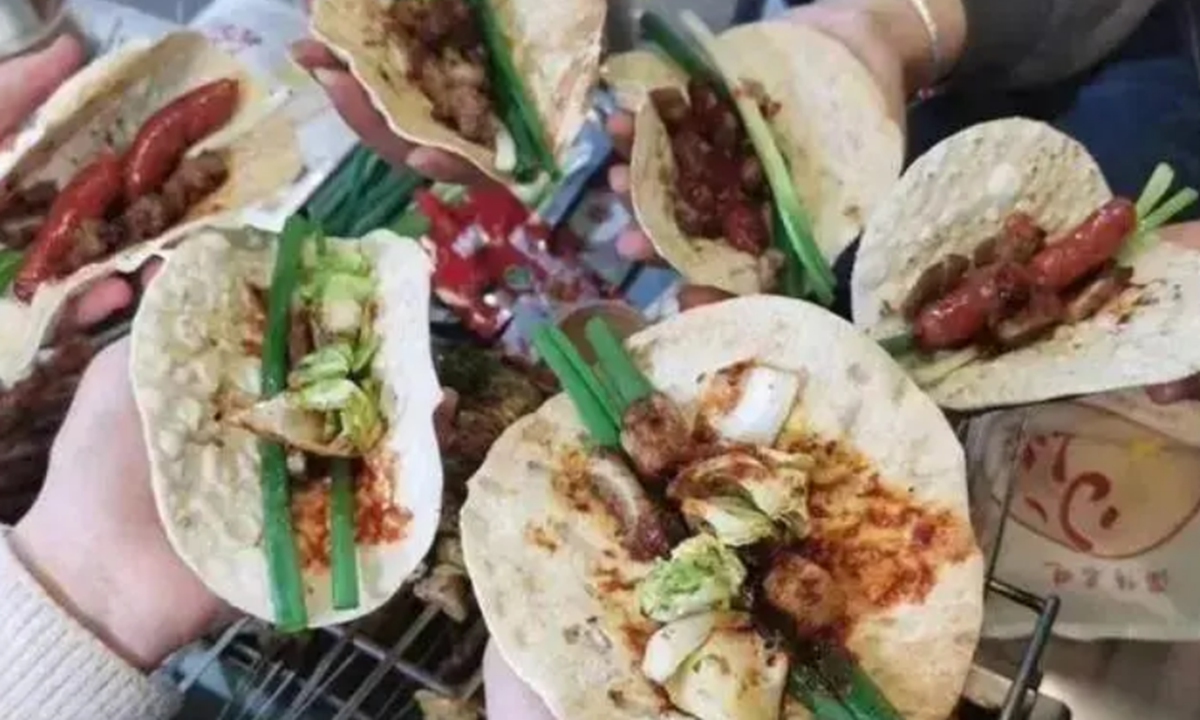E.China’s Zibo goes viral for barbeque with special trains taking visitors to explore scenery and food

Zibo barbecue Photo: screenshot from website
"The high-speed railway trains are packed with visiting tourists and the air smells of cumin." This is how netizens described Zibo, a city in East China's Shandong Province over the past month.
Zibo city has recently gone viral on Chinese social media to its local specialty food, Zibo barbecue. The city has recently set up special tourist trains, bus routes to attract swarms of tourists, particular the young people to travel to the city to try the barbecue, offering the latest example of step-upped efforts by the local government to promote tourism and drive economic growth after China optimized its COVID-19 approaches.
The barbecue from Zibo is unique and offers a distinctive dining experience. It has a small stove at each table. When the skewers are served, customers have to process them themselves and wrapped them in a thin pancake, usually with a spring onion added. The immersive experience of making customized "Zibo barbecue" offered a sense of participation and leisure time for diners.
An owner of local stand Dazui barbecue surnamed Liu told the Global Times on Monday that his sales on Saturday alone can reach 12,000 yuan ($1,744) and 80 percent of them are tourists from other cities.
“I would suggest the locals to avoid coming on weekends,” Liu said, saying that the number of customers triple over the weekends compared with weekdays.
Another stand owner surnamed Wen told the Global Times that barbecue went viral after local young people shared their experience on social media with pictures and videos.
“The barbecue has a lot of local flavor. I expect to make good money this summer,” Wen said.
According to Radio and TV Station of Zibo, since March, the search volume of local "barbecue" has increased by over 370 percent year-on-year, and the search volume of "Zibo barbecue" on the whole platform has increased by over 770 percent year-on-year.
The local government also took advantage of the Zibo barbecue trend to bring more tourists to the city.
In order to encourage people coming to the city, Zibo set up a specially customized "barbecue map", and added 21 new barbecue bus lines, so that tourists can "get on the bus to rest, get off to eat", paper.cn reported.
Since March 31, China National Railway Jinan Bureau added two bullet trains between Jinan, East China’s Shandong Province and Zibo over the weekends so as to provide convenience for tourists to come and eat barbecue on weekends. The city also offered tourists to visit some scenic spot in the city free of charge with high-speed train tickets.
According to the data released by Zibo Tourism Bureau, on March 5, the number of passengers arrived and departed through Zibo railway station reached 48,000, setting the highest record in nearly three years.
The sudden popularity of Zibo barbecue and its fame on internet is a combination of a number of factors, Zhu Danpeng, a veteran analyst in food industry told the Global Times on Monday.
First and foremost China’s optimized COVID-19 approaches and its emerging out of the epidemic brings the hustle and bustle back to cities. The promotion on social media, such as douyin, also played a role in this, Zhu said.
He noted that Zibo is not the only city that has stepped up efforts to promote its characteristics.
Recently, Jinan, in East China’s Shandong Province is also very lively. Since the beginning of this year, the Chaoran building near the Daming Lake has become popular on social media platform because of a short video of the moment the lights are turned on, and has become an Internet celebrity landmark and a place for tourists to check in.
“At present, the local governments all over the country are using some characteristic scnery and local delicacies to create their own city name cards. Such as cities like Changsha, Central China’s Hunan Province and Chengdu, Southwest China’s Sichuan Province. All of these are very successful,” Zhu noted.

